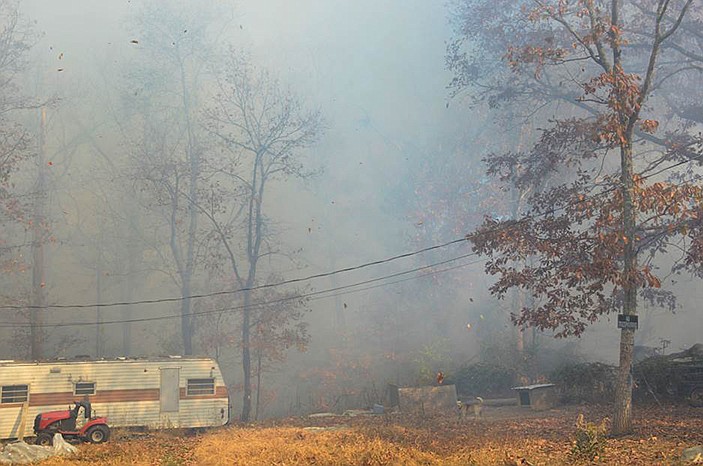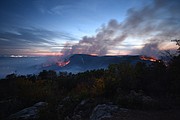Wildfires ravage Southeast
- Two juveniles arrested, charged in deadly Gatlinburg wildfires
- Tennessee takes four area counties off burn ban list to aid tornado cleanup
- Rain helps with area wildfires, but Tennessee burn ban remains [videos, photos]
- Gatlinburg wildfires death toll climbs to 14; officials estimate 1,684 structures damaged or destroyed
- Nonprofits and state agencies step up relief efforts amid tornado, wildfire damage
- Man charged for allegedly intentionally setting a Sequatchie County wildfire
- Rain brings relief for wildfires
- Southern storms should ease drought, but fire threat remains
- At long last, substantial rain is expected throughout Chattanooga area
- Gov. Bill Haslam applauds wildfire fighters' efforts
- Firefighters make progress in Southeast wildfires, but threat remains
- Crews fighting large fire in northeast Alabama
- Gov. Haslam vows to pursue wildfire arsonists 'with everything we have'
- Hamilton County wildfires to cost more than $600,000
- Forestry crews prepared to miss Thanksgiving with families as they battle wildfires
- Wildfires rage on; new one pops up in North Georgia
- Gasp! Wildfires cause hacking and wheezing across the South
- Air quality improves, rain possible this weekend
- Relentless smoke spreads fear at edge of southern wildfires
- Catoosa County issues burn ban
- Many outdoor activities banned as fires burn across south
- Two men charged with arson as crews make progress quelling 3 area blazes
- Chattanooga is on target to break record for driest year in city's history
- Alabama man confesses to starting Sequatchie County fire
- Area wildfires containment increases, Flipper Bend fire 95 percent contained
- Catholic Mass offered for wildfire relief
- Fire crews hope to reach 100 percent containment on 3 area wildfires
- Wildfire smoke engulfs Chattanooga, endangering health of residents
- No rain in forecast as Chattanooga area wildfires continue to burn
- Tennessee Gov. Haslam issues 51-county burning ban
- Firefighters use hand tools to fight Chattanooga-area wildfires with no rain in sight
- Hundreds hospitalized with breathing problems amid Chattanooga-area wildfire outbreak
- Sohn: Might wildfire smoke be harbinger of days to come?
- New fires sprout in Chattanooga area as firefighters work to contain thousands of acres burning across region
- Arson suspected in most Chattanooga area wildfires
- UPDATE: Man arrested after admitting he set three wildfires that consumed 300 acres
- The latest update on the unprecedented fire season in the tri-state area
- Wildfires burning total of 9,680 acres across eastern half of Tennessee; FEMA steps in to offer aid [videos, photo galleries]
- Southern fires rage with 41.6 million now living in drought
- Wildfires continue across region with no rain imminent; some residents evacuated
- Chattanooga area wildfire smoke triggers 'Code Red' air quality alert [videos]
More than 200 patients have been treated in Chattanooga for shortness of breath and other breathing difficulties related to the circle of wildfires surrounding the city.
Since Friday, CHI Memorial has treated 96 patients in Chattanooga and Hixson for breathing difficulties related to the smoke, including 37 in the past 24 hours.
Erlanger has treated nearly 120 patients for shortness of breath since Nov. 1, an increase over the typical number of such patients the hospital sees, the hospital said in a news release. The worst day for breathing complaints at Erlanger was Nov. 10, when 15 patients complained about shortness of breath, about triple the usual number.
Erlanger pointed out that it treats symptoms, and it is unknown if all patients with breathing complaints came to the hospital because of the wildfires.
The region's wildfire epidemic shows no signs of slowing, with no rain in the forecast and additional fires popping up on a regular basis.
Firefighters are using hand tools, bulldozers and helicopters to contain existing wildfires, while warning that many of the additional fires seen in recent days are man made.
Medical officials advise patients with breathing difficult to avoid outdoor activity and stay inside as much as possible. Use the "recirculate" function when in a vehicle, and ensure that air filters in homes are operational.
The smoke has triggered a "Code Red" air quality alert.
The Times Free Press previously reported that area doctors warned the problem can be particularly severe for those already suffering from breathing troubles.
"Our more vulnerable people - the elderly, the very young, as well as people who already have heart and lung diseases, bad sinuses, bad allergies, lung disease - if they go outside and breathe in a lot of that smog it can trigger an asthma attack or bronchitis attack," said Dr. Carlos Baleeiro, a pulmonary and critical care physician with CHI Memorial's Buz Standefer Lung Center.
The only real solution is to avoid working or exercising outdoors, he said. Masks probably won't do much good, Baleeiro said.
"Most of the masks you can buy at a store, the little paper masks, don't work, because the particles are so small," he said. "You would need a true isolation mask like we would use in a hospital. They fit tighter on the face, but if you are already prone to lung problems, and put on a tight-fitting mask, it doesn't make it any easier to breathe."

